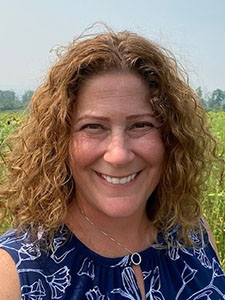Melissa Parks
Associate Professor of Education
Melissa Parks is an associate professor of education at Stetson University. Formerly, she was a National Board Certified elementary school teacher practicing in both Florida and Massachusetts. She is passionate about teaching. She believes in the power of a positive classroom built from a foundation of learning activities created to foster and engage students in exploring, and expanding, natural curiosities. In addition to her teaching, she is an area director for the Florida Association of Science Teachers. Parks has served on the Outstanding Science Trade Books Panel of the National Science Teaching Association and is currently serving on the Preschool-Elementary Science Teaching Panel of the National Science Teaching Association.
- PhD, Curriculum and Instruction, Florida Atlantic University
- MEd, K-8 Math and Science Education, University of Central Florida
- BA, Elementary Education, Westfield State University

Biography
Melissa Parks, PhD, is an associate professor of education at Stetson University. Before her post-secondary work, Parks was a National Board certified elementary school teacher practicing in both Florida and Massachusetts. Professor Parks is an active member of the National Science Teaching Association (NSTA). She is currently a member of the NSTA Post Secondary Science Teaching and Best STEM Books Committees. She has previously served on the Early Childhood-Elementary Science Teaching and Outstanding Science Trade Books Committees. Using her educational platforms, Parks strives to inspire a love of learning and environmental stewardship built on an appreciation of and knowledge about the natural world. Parks has published extensively and presented nationally on the importance of using children’s literature to elevate young students’ engagement with and understanding of science, STEM, and environmental stewardship.
More About Melissa Parks
Areas of Expertise
- Environmental Elementary Education
- Elementary Curriculum Development
- Elementary Pedagogy
- Preservice Teacher Effectiveness
Course Sampling
- Natural & Social Sciences in the Elementary School
- Exploring Environmental Identity
- Educational Psychology
- Environmental Elementary Education
- Elementary Curriculum Development
- Elementary Pedagogy
- Preservice Teacher Effectiveness
- Parks, M. (2025). Conversation and coursework: Strategies to engage undergraduate students with course content. Faculty Focus. Magna Publications.
- Parks, M. (2024). Gliders, cats, and crashes: An elementary engineering experience exploring flight. Science and Children, 61(3), 58-63.
- Parks, M. & Oslick, M.E. (2024) Empowering student learning: Navigating artificial intelligence in the college classroom. Faculty Focus. Magna Publications.
- Parks, M. (2023) Rolling out the red carpet: Ways to welcome new faculty. Supporting Faculty, Leading Faculty with Purpose and Vision 1(4), 12-13.
- Parks, M. (2023). Reading, talking, & doing: Using children’s literature to develop environmental literacy. The Leaflet (publication of NEATE) 37-49.
- Parks, M. (2023). Florida’s backyards: Using trade books to develop elementary students’ environmental literacy. Florida Literary Journal 3(1), 7-22.
- Parks, M. (2021). Talking trash: Making time for environmental awareness in primary grades. Florida Association of Science Teachers Journal, 11-15.
- Parks, M. (2020). Model eliciting activities. Another tool for the elementary toolbox. Science Activities: Projects and Curriculum Ideas in STEM Classroom. DOI: 10.1080/00368121.2020.1782315
- Parks, M. (2020). The second-grade roadster challenge. A model eliciting activity. Science and Children, 57 (7), 22-27.